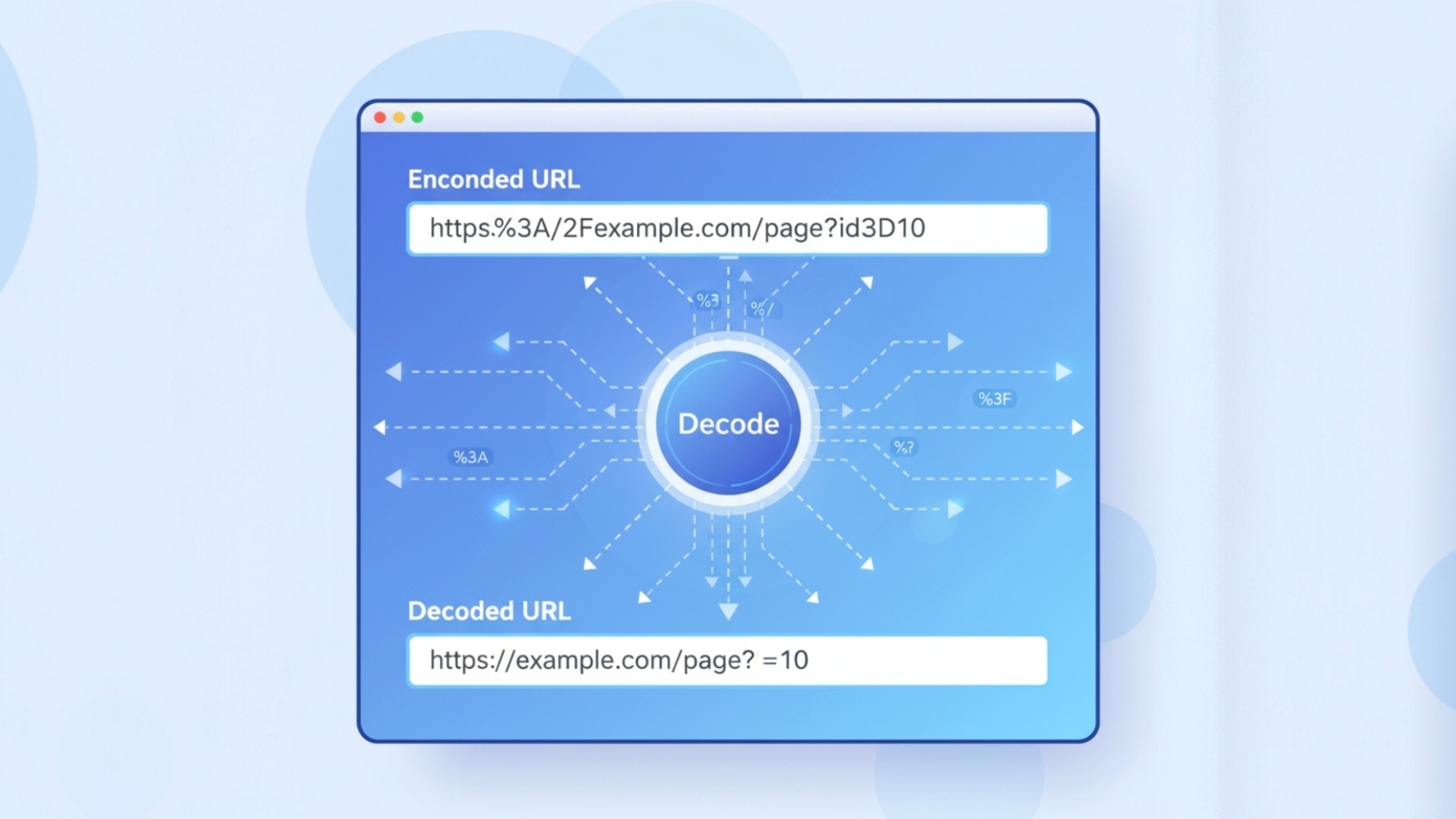
URL Decoder
Created on 16 October, 2025 • Converter Tools • 47 views • 2 minutes read
A URL decoder is a simple but indispensable tool that converts percent-encoded URLs back into readable text.
URL Decoder: Decode Encoded URLs Quickly and Safely
A URL decoder is a simple but indispensable tool that converts percent-encoded URLs back into readable text. URLs often contain encoded characters (like %20 for spaces or %3A for colons) to ensure safe transmission over the web. Decoding transforms these sequences into their original characters so humans and programs can read, analyze, and process the data correctly.
What Is URL Encoding and Why Decode?
URL encoding (also called percent-encoding) replaces characters that are not allowed or have special meaning in URLs with a percent sign followed by two hexadecimal digits. For example, a space becomes %20 and the ampersand & becomes %26. Encoding prevents ambiguity in query strings, path segments, and form submission data.
A URL decoder reverses this process. You might need to decode URLs when debugging web applications, reading query parameters, extracting data from links, or displaying readable URLs to users. Decoding is especially useful when working with analytics, logs, or APIs that return encoded strings.
How a URL Decoder Works
The decoding process scans the encoded string for percent-encoded sequences and converts each %HH sequence (where HH is hexadecimal) back to the corresponding byte or character according to the chosen character encoding (usually UTF-8). Decoders also transform plus signs (+) used in some contexts into spaces.
Typical Steps in Decoding
- Locate percent-encoded segments (e.g.,
%20,%E2%9C%93). - Convert hexadecimal pairs into byte values.
- Assemble bytes and interpret them with the correct character encoding (commonly UTF-8).
- Replace any plus signs with spaces if the encoding context expects it (application/x-www-form-urlencoded).
Common Use Cases for URL Decoding
URL decoders are valuable in many web and development scenarios:
1. Debugging and Development
Developers decode URLs to inspect query parameters, troubleshoot form submissions, and ensure routing works as expected. Decoded values make it easier to verify expected inputs and server behavior.
2. Data Extraction and Analytics
When analyzing logs or tracking links, decoding URLs helps extract clean parameter values — such as search terms, campaign IDs, or user-generated content — for accurate reporting and segmentation.
3. Security and Forensics
Security analysts decode URLs to reveal obfuscated payloads, phishing links, or injection attempts hidden inside encoded parameters. Proper decoding is a key step in threat analysis and incident response.
Tools and Examples
Most programming languages provide built-in decoding functions. Examples include:
- JavaScript:
decodeURIComponent()anddecodeURI()for client-side decoding. - Python:
urllib.parse.unquote()andunquote_plus()in the standard library. - PHP:
urldecode()andrawurldecode().
Online URL decoder tools let non-developers paste encoded strings and get immediate, human-readable results. They typically handle UTF-8 decoding and optionally convert plus signs to spaces.
Best Practices and Security Considerations
When decoding URLs, follow these best practices:
- Always assume UTF-8: Most modern web services use UTF-8; decode bytes accordingly to avoid misinterpreted characters.
- Validate input: Treat decoded values as untrusted and validate or sanitize them before use to prevent injection attacks.
- Log safely: Avoid storing sensitive decoded data in logs without masking or encryption.
- Use library functions: Prefer tested standard-library decoders rather than ad-hoc parsing to avoid subtle bugs.
Conclusion
A URL decoder is a basic yet powerful utility for making encoded web data readable and actionable. Whether you are debugging web apps, analyzing traffic, or investigating security incidents, decoding URLs correctly is an essential skill. Use trusted libraries, assume UTF-8 encoding, and validate decoded content to keep your applications robust and secure.
Popular posts
-
BMP To WEBPImage Manipulation Tools • 155 views
-
BMP To ICOImage Manipulation Tools • 101 views
-
BMP To PNGImage Manipulation Tools • 100 views
-
Reverse Ip LookupChecker Tools • 94 views
-
IP LookupChecker Tools • 78 views